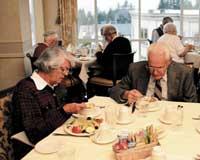Feeding in the elderly
From the age of fifty-five, body metabolism slows down, that is, the body uses less energy to perform the same activity, so daily energy needs must adapt. Over time the composition of the body changes. Muscles decrease and fat accumulates, and as the energy expenditure of fats is much lower, we need less kilocalories as the years pass. Therefore, in old age it is advisable to bet on foods with higher nutritional density and fewer calories when organizing daily menus.

At the same time, the deterioration of many proteins makes that in old age humans have a great need for protein, almost the same as in childhood: experts recommend ingesting a gram of protein per kilo of weight. Of these, 60% are of animal origin and 40% of plant origin.
The need for mineral salts and vitamins, such as calcium, is significantly greater than that of adults. To keep the bone structure firm and avoid osteoporosis problems it is recommended to take the same calcium as the pregnant woman, and much better if it comes from dairy products. However, to avoid diarrhea and winds, it is better to take yogurts and cheeses that do not contain lactose. In fact, with age, the enzyme that metabolizes lactose decreases in the intestine and excess lactose dairy can harm.
To combat blindness associated with old age it is advisable to ingest antioxidant vitamins (vitamins C, E and A). Several studies have shown that these vitamins protect the eye from macular degeneration.
On the other hand, starchy foods are needed every day, but care must be taken with simple carbohydrates to facilitate insulin work and avoid problems of hypoglycemia and hyperglycemia. However, following a balanced diet, having a proper weight and doing some exercise, insulin production is virtually assured.

Water is also essential for older people, because as the body ages it tends to dry out and we do not feel thirsty. But, despite not being thirsty, it is advisable to drink a liter and a half of water a day, especially when rising in the morning, after dinner and outside meals, since water helps eliminate body toxins and protect the urine system at the same time. If we don't have a habit of drinking water, juice, soup, broth, infusion, vegetables and fruits are perfect.
Cooking properly
To avoid heavy digestions, special attention must be paid to the preparation of food, with the best options being the oven, steam and iron. Fried, on the other hand, the less the better, because the food absorbs a lot of fat. This will only achieve a significant increase in calories and make digestions heavier. When cooking food, it is not advisable to use much water or cook for a long time to avoid losing vitamins.
On the other hand, many older people have to make a diet without salt, and for these cases the spices are helpful: parsley, oregano, basil, paprika, pepper, clove, etc.
Constipation problems are also quite common in old age. In these cases, foods rich in water and fiber should be consumed every day, such as vegetables, fruits, pods, whole grains, etc.
Food and medicines
Many seniors take medicine daily and more and more experts highlight drug and food interactions. It is very important to know when and how to take the medicines, so keep in mind the doctor's directions. However, some medicines are taken without a prescription and therefore without any control, such as antacids and laxatives. When taking them, the nutritional components that are incorporated through food may be much less absorbent, which can affect health. For example, antacids prevent the absorption of folic acid and iron, there are diuretics that remove appetite and laxatives prevent the absorption of vitamin A and D, calcium and phosphorus.
Therefore, in addition to carefully organizing daily meals, be careful with drug and food interactions and in case of doubt consult the doctor.
Solutions for people with chewing problems
Chewing problems are common among older people, as sometimes some teeth and teeth are missing and others have teeth. Therefore, in many cases there are foods that are eaten more easily than others; for example, nuts are not a pleasant meal, as they often stay between teeth and teeth. Meat, especially the oldest animal, costs to chew. White meat is the easiest to eat, because it is the most tender. Vegetables can be mixed and eaten in puree, if there is no other alternative. However, if in all meals the structure of three dishes is better respected, since the food has a psychological aspect and is of vital importance at that age.

It has already been said before that in the elderly the need for protein is high and eggs are a great opportunity to satisfy it. If we have trouble chewing and have no problems with cholesterol, we can eat quiet eggs and have a perfect protein, the best of nature. Fish, milk, and dairy are also easier to eat than meat, and they all have a similar amount of protein. In times our grandparents enjoyed a milked egg, which contains most of the most urgent protein, vitamins and saline minerals.
Due to the problems of chewing or lack of appetite for some diseases, the eating habits of some older people are quite scarce and with many deficiencies. To combat it there is more and more food prepared and, if you choose well, they are a great opportunity. Fruits and dairy products, for their part, do not need preparation and it is recommended to have it always at hand, since they are ideal to meet the needs of the elderly.
There are on the market products suitable for people with chewing problems, such as smoothies, prepared to meet the needs of the body. But these products have two problems: on the one hand they are quite expensive and, on the other, they are boring. Therefore, when there are chewing problems it is advisable to bet on soft foods, but whenever possible maintaining the usual customs.
Buletina
Bidali zure helbide elektronikoa eta jaso asteroko buletina zure sarrera-ontzian








